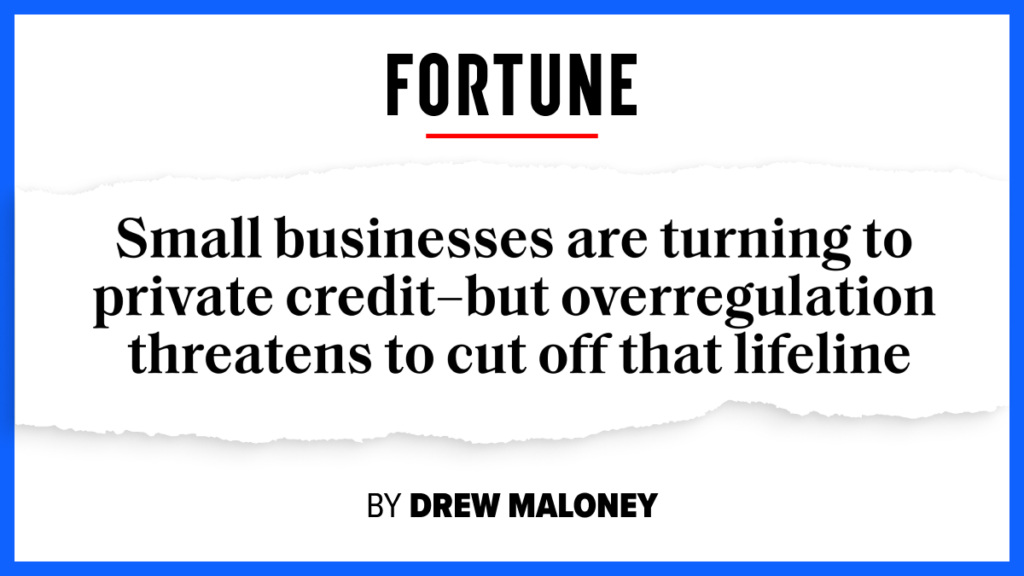Maloney Op-Ed in Fortune: Small Businesses Are Turning to Private Credit
Maloney: “Small businesses need more access to capital, not less. Washington should embrace the ways the industry is providing them financial stability and encourage this flow of capital from investors to American businesses.”

Today, Fortune published the following op-ed from AIC President & CEO Drew Maloney discussing how the private credit industry has emerged as a lifeline for small businesses. In the piece, he shares how private credit is strengthening American businesses of all sizes and providing capital to invest in their employees.
Read the full op-ed below:
Small businesses are turning to private credit – but over-regulation threatens to cut off that lifeline
By AIC President & CEO Drew Maloney
January 24, 2024
Securing funding for a small business in the U.S. looks a lot different than it used to. Historically, small business owners had two main options: attract investors–or approach banks for loans. However, the lending landscape has shifted and a growing number of small business owners are exploring an alternative source of capital: private credit.
Private credit refers to loans provided by non-bank institutions to businesses. In the past decade alone, the private credit sector has witnessed an impressive increase from $400 billion to $1 trillion in assets. Some of the largest private equity firms are expanding their private credit operations, and investors ranging from pension funds to family offices are making greater investments in the asset class.
While the appeal has grown, private credit is not exactly a new entrant to the financial world. Since the late 1970s, small and medium-sized businesses have tapped into private credit, often when they did not qualify for loans from traditional banks or needed capital beyond what banks were able to provide.
I’ve heard from small business owners about how private credit positively impacts their businesses, workers, and communities. To take just one example, the founder and chief executive of an early childhood education company recently told me that private credit has allowed them to provide employees with better health insurance, retirement security, and other benefits.
It also has given him access to experts who’ve provided guidance on how to scale and navigate business challenges. “[Business owners are] starving for someone to have a conversation with about how to become better and how to improve our operations. That’s certainly what private credit and our partners have afforded us the opportunity to do,” he said.
Both businesses and investors have shown growing interest, and the impact is clear. In 2022 alone, EY estimates that private credit supported an estimated 1.6 million jobs, contributing $137 billion in wages and benefits and generating $224 billion for the GDP. Small businesses across all 50 states benefit from private credit. Importantly, most are small businesses with revenues below $100 million.
Unsurprisingly, as with any booming sector, as the private credit industry grows, so do the calls for increased regulation. In this case, it’s essential to consider the current environment and broader impact of over-regulation of the industry on small businesses.
Some critics want to subject private lenders to requirements and regulations in line with those of banks. These misguided calls fail to take into account the major differences between private credit and traditional bank loans, in particular the fact that private lenders do not use customer deposits to make bank loans. Also, private lenders engage in several risk-reducing characteristics that are inherent to the private credit business model.
Notably, investors commit funds for long durations and cannot quickly withdraw their investments at once, so there is no “run risk” in private credit. This is partly why a Federal Reserve’s recent Financial Stability Report vouched for the sector’s stability, stating “the financial stability vulnerabilities posed by private credit funds appear limited.” Researchers from the Federal Reserve’s Board of Governors also recently found that PE-backed loans have lower credit risk relative to comparable non-PE-backed loans.
Private equity and credit firms are appropriately regulated by the U.S. Securities and Exchange Commission (SEC). Private credit firms, generally among other requirements, are subject to registration with the SEC, on-site SEC examinations, comprehensive compliance programs, and regular reporting of asset and business information to the government.
Elected officials on both sides of the aisle can likely agree that private credit is an essential resource for America’s small businesses. Small businesses need more access to capital, not less. Washington should embrace the ways the industry is providing them financial stability and encourage this flow of capital from investors to American businesses. Policies need to provide access to lending, not impose unnecessary rules and barriers.
The consensus among many in the financial sector is clear: the system, as it stands, is fulfilling its intended purpose. Banks are continuing to provide loans. Meanwhile, private credit investors are lending to businesses who do not qualify for those loans or need additional support. This sector is not merely an alternative form of investment for small businesses–it’s foundational to their stability and capacity to grow.
###
This article originally appeared on Fortune.com.


